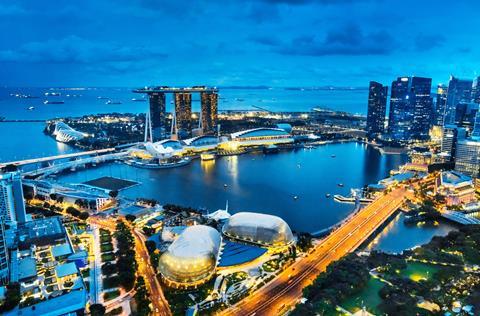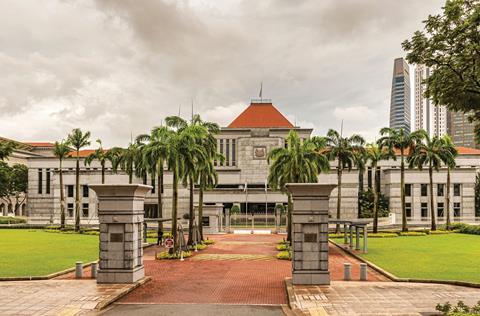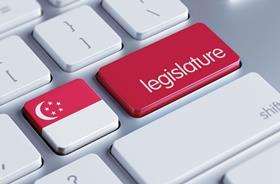With the government backing a drive to make Singapore a cutting-edge legal hub, dozens of foreign firms are vying with each other for a slice of the action. Marialuisa Taddia reports
THE LOW DOWN
When it broke from a newly independent Malaysia, Singapore set about making itself a highly developed economic powerhouse with a focus and determination that paid off. The city-state’s government is now intent on realising its ambition of becoming a state-of-the-art global legal hub, with state-sponsored high-tech dispute resolution facilities to match. Investment in that infrastructure is deemed essential to serve the needs of the 7,000 multinationals that have their headquarters in Singapore, who in turn have attracted 100-plus international law firms. But city-states, even bold ones, do not stand alone. The price of an open economy and liberalisation is greater exposure to the effects of trade tensions between the US and China and political instability in the region.
Singapore is attracting increasing numbers of lawyers from around the globe, drawn by a generous helping hand from government and a dynamic, open economy.
With the objective of positioning the south-east Asian nation as a state-of-the-art legal hub in the region and beyond, the state provides incentives for international law firms to set up and expand business. Nine foreign law firms have been awarded a special licence by the Ministry of Law (MinLaw) – generating more than S$400m (£222m) in total revenue in 2016/17. There are more than 100 other international law firms, including from the UK and US, operating in the Lion State under other arrangements.
Western firms are also following the trail of 7,000 multinationals that are headquartered in the state, and a growing number of technology companies are making Singapore their Asia-Pacific base. This includes Google and, soon, British manufacturer Dyson, which has chosen Singapore, instead of the UK, as a base for its first electric power plant.
SEE ALSO
- Five-star service
- ‘Fantastical’ to assume Beijing control over Hong Kong
- Commercial realities
- Window on the world
Singapore’s advantages are many: it has a politically stable government, low taxes, an efficient legal system that is based on English common law and highly developed infrastructure. Singapore is also the perfect gateway to other ASEAN nations, as well as China and India.
‘Many multinational businesses are increasingly headquartering their Asia operations in Singapore,’ says Linklaters’ global co-head of innovation Sophie Mathur. ‘As more decision-making is happening in Singapore, the decision-makers are keen for advisers to be based there. Singapore, as a hub for the region, provides a breadth and depth of opportunity, whether it be in technology, energy, healthcare, financial services or consumer sectors, or geographically across Indonesia, Vietnam, Philippines, or Myanmar.’ Mathur, a corporate lawyer who advises on cross-border transactions across south-east Asia, adds: ‘Much of the investment and deal-making either originates from or funnels through Singapore.’
What also attracts business is the significant role played by government in planning and investment. ‘Singapore is a successful, and vibrant, mixed-market economy,’ says Philip Fong, managing partner of Eversheds Harry Elias (EHE), the result of the 2017 merger between Eversheds Sutherland and Singapore’s Harry Elias Partnership (currently employing 100 fee-earners, including 22 partners in Singapore). ‘There is no doubt that some of that success can be attributed to carefully managed intervention by the government, particularly by encouraging investment and other support from private enterprise.
‘The Singapore legal sector has a highly educated workforce, a respected judiciary, leading academics, and one of the key arbitration centres in Asia,’ Fong adds. The government is ‘building on these foundations to transform Singapore into a global legal centre’.

DISPUTE CENTRE
The Singapore International Arbitration Centre has a strong marketing operation. Its central message in pitching for the regional disputes crown starts with its ranking as the ‘least corrupt public sector in Asia’. Ease of business is also stressed – in contrast with some of its neighbours, Singapore is a ‘strong multicultural society, with excellent legal and technological expertise as well as language fluency’. Some 6,600 scheduled flights a week fly to 320 cities. As a party to the 1958 New York Convention, Singapore arbitration awards are enforceable in 150 countries. No work permits are needed to carry out arbitration services in Singapore, and its ‘Maxwell Chambers’ is Asia’s first fully integrated dispute resolution complex with state-of-the-art hearing facilities. It also claims ‘lower costs than in almost any other major centre of arbitration’.
Kai-Niklas Schneider, managing partner of the Clifford Chance Singapore office, says the government’s focus on developing technology for use in legal services is ‘testimony to Singapore’s leadership in driving innovation and embracing opportunities presented by emerging technologies’.
Take the S$2.8m (£1.57m) Tech Start for Law Programme by MinLaw, the Law Society of Singapore, and Enterprise Singapore, a Ministry of Trade agency which helps Singapore-based companies grow. Some 70% of the first-year cost of adopting technology for practice management, online research and marketing was available to small and medium-sized law practices between March 2017 and February this year.
Philip Jeyaretnam, global vice-chair and ASEAN CEO at global firm Dentons, singles out the Future of Law Innovation Programme as a ‘key development on the legal technology front’. FLIP is part the Legal Technology Vision, a five-year ‘roadmap’ published in 2017 by the Singapore Academy of Law (SAL) to help lawyers leverage technology to enhance their practice. SAL is an agency set up by statute to promote and develop the country’s legal sector.
Launched by SAL in January, FLIP is a two-year programme that brings together lawyers, technology companies, government bodies and investors with the mission ‘to drive innovation and encourage the adoption and invention of new technologies’ among law firms, legal departments and tech startups. The aim is to create ‘a vibrant legal technology ecosystem in Singapore’.
FLIP has three components: a Legal Innovation Lab; a virtual community platform called LawNet Community; and a legal tech ‘accelerator’ – south Asia’s first, according to SAL – which is due to start in the first quarter of 2019. Promising startups will receive business mentorship via a structured 100-day programme, as well as pre-seed funding from SAL Ventures (a subsidiary of SAL) and grants from Enterprise Singapore, in return for equity.
FLIP also involves academics. For example, the Singapore Management University School of Law is conducting research on current and future trends in legal innovation across Asia-Pacific. It will present its findings at next April’s FutureLaw Conference at Stanford Law School.
Dentons Rodyk, a combination of Dentons and Singapore’s Rodyk & Davidson, is a member of FLIP. The firm recently adopted ‘Contract Companion’, a tool that leverages artificial intelligence to enable lawyers to complete tasks, such as reviewing and proofreading agreements, more quickly, Jeyaretnam explains. ‘One of our senior associates, Zhi Hao Loy, helped to drive the pilot and business case through Dentons Rodyk’s internal innovation curriculum, developed in partnership with FLIP,’ he says. There are 20 legal technology pilots running across the firm. ‘Many of our most successful projects involve technologists and companies that we have met through FLIP,’ Jeyaretnam says. One of them allows real estate developers to keep up to date with the progress of unit sales through a secure site where they can instantly keep track of relevant information, such as upcoming deadlines for buyers, and outstanding or completed payments.
Linklaters is another member of FLIP, which has so far attracted 33 entities, including: Clyde & Co, PwC Legal International, Rajah & Tann Singapore, Malaysia’s Halim Hong & Quek; in-house counsel from BNP Paribas and Discovery Networks; and local and international legal tech startups such as LexQuanta, MyLawyer and Zegal.
Mathur, who sits on the FLIP steering committee, and is on the board of the soon-to-be launched accelerator, says: ‘FLIP’s role is crucial in creating a community to allow law firms, both big and small, to share expertise and to bring together legal professionals with tech start-ups.
‘As a firm, we are looking to develop new tech such as AI and blockchain in a multitude of areas, from document automation, through to due diligence, corporate governance and smart contracts. Many of our first proof of concepts for both industry incumbents and startups were first deployed in Singapore, and some of these have now gone on to be deployed on live matters around the world. For us, Singapore is a key incubator for legal tech solutions.’

In May, Clifford Chance announced plans to launch a Singapore-based Asia-Pacific ‘innovation and best-delivery hub’ with financial support from government agency the Economic Development Board (EDB).
Alongside Linklaters, Clifford Chance is one of the nine international firms to hold a qualifying foreign law practice (QFLP) licence. This allows foreign firms to practise Singapore law in defined areas. Clifford Chance has also established a ‘formal law alliance’ with Cavenagh Law, and it employs 119 legal professionals in Singapore.
The firm’s investment in innovation and legal technology has already resulted in the launch, for example, of CCDr@ft, a contract automation tool for clients; an online MiFID2 client regulation toolkit, powered through Neota Logic; and a cloud-based transaction management solution, delivered through Workshare. ‘We are also adopting AI tools to improve the speed and efficiency of large-scale due diligence exercises,’ Schneider says. With the new Singapore-based hub, Clifford Chance hopes to develop and roll out similarly innovative features through Asia-Pacific and beyond.
Government initiatives abound, including the Legal Industry Framework for Training & Education, launched by SAL in 2017. LIFTED is a professional learning resource to ‘make continuing legal education relevant and accessible’. It includes a mobile, web-based app to help individuals assess their learning needs based on their current and future roles in the legal sector.
Fong points to the ‘Lawyers Go Global’ programme launched in January by MinLaw, the Law Society of Singapore and Enterprise Singapore. This consists of eight overseas missions over the next three years to bring Singapore lawyers to ‘fast-growing regional countries’, such as China, India and ASEAN members; training on foreign markets; and profile-raising and promotion of the ‘Singapore lawyer’ brand overseas.
MinLaw has also organised delegations to China to promote the dispute resolution services of Singapore law firms and institutions, such as the Singapore International Arbitration Centre (SIAC).
Underpinning SIAC, launched in 1991, are the Singapore Mediation Centre and the Singapore International Commercial Court (SICC) launched in 2014 and 2015 respectively – all competing with other global dispute hubs, such as London. ‘It helps Singapore, a disputes centre, maintain its current lead in terms of the numbers of cases seated and heard there,’ says Jeyaretnam, whose firm Denton Rodyk regularly undertakes high-profile, complex cross-border cases.
‘Singapore is one of the fastest-growing arbitration centres in the world,’ says Fong, who heads the EHE litigation practice group. The numbers speak for themselves: 452 new cases were filed in 2017 from parties in 58 countries, including from Europe and the Middle East, valued at $4.07bn, according to SIAC’s annual report. This represents a 32% increase on the 343 cases filed in 2016, and more than five times the number a decade ago.
‘This growth reflects a number of factors including a stable, neutral and high-quality legal system,’ says Fong, whose firm boasts one of the largest arbitration teams in Singapore, with more than 15 specialists, including nine partners. ‘We are confident this trend will continue. In January, the Supreme Court of Judicature (Amendment) Act was passed, clarifying the jurisdiction of the SICC. This is now the same as the Singapore High Court’s, to hear proceedings relating to international commercial arbitration under the Singapore International Arbitration Act. ‘As a result, parties benefit from access to both local and international judges, and can transfer matters from the SICC to the High Court and vice versa,’ Fong says.

Linklaters has doubled the size of its dispute resolution team in Singapore in the past two years as a result of a ‘marked increase’ in the number of international arbitrations, Mathur says. ‘Similarly, the SICC is growing in prominence, and is increasingly an attractive forum for resolving banking and financing disputes. We have regular dialogue with clients regarding the role of the SICC, particularly in the context of [its] push to make Singapore a restructuring and insolvency hub for the region.’
Deborah Barker, managing partner of Withers KhattarWong, an FLA between UK’s Withers and Singapore’s KhattarWong, says the number of commercial disputes handled by the Singapore office has grown, thanks to the success of both SIAC and SICC. Barker, a partner in the firm’s litigation and arbitration team, recently acted for Taiwan’s Yuanta Asset Management in one of Singapore’s first appeal cases to be decided at the SICC; she secured a favourable outcome for the client where the quantum of certain orders made was reduced, and a cross-appeal entirely dismissed. Barker also highlights a decision by the Singapore High Court in September in which Justice Chua Lee Ming made a declaration permitting a commercial third-party funding arrangement to proceed in the context of a corporate collapse affecting Singaporean retail investors. ‘Justice Chua held that the [TPF] agreement was not contrary to public policy in Singapore, a finding which could have broader implications for the funding of commercial litigation in Singapore outside of the insolvency context,’ she says.
The movie Crazy Rich Asians springs to mind when thinking of the city-state, and indeed Withers, as one of the largest international law firms focusing on private capital in Singapore, has advised 48% of Forbes Singapore’s 50 richest (their combined wealth increased by 11% in 2018 to nearly $116bn). In this context, Barker describes the passing in October of new legislation on variable capital companies (the Variable Capital Companies Act) as ‘a major development’.
The VCC is a new legal entity and structure for investment funds. ‘The introduction of the Singapore VCC is intended to further enhance Singapore’s appeal as an international fund management hub,’ Barker says. Not only does it expand Singapore’s ‘existing toolbox of domestic vehicles’, but it more closely aligns it with other offshore jurisdictions, such as Hong Kong, Luxembourg and Ireland, Barker says. In anticipation of growth in this market, the firm has launched Withers Asia regional funds to provide ‘a one-stop fully integrated service’ of legal, tax, regulatory and compliance for fund sponsors, investment advisers and investors.
Singapore is also updating its insolvency and debt restructuring laws with the introduction by MinLaw of a new ‘omnibus bill’. The bill consolidates the personal and corporate insolvency and restructuring laws, which are in two separate statues (the Bankruptcy Act and Companies Act). ‘These changes are aimed at making Singapore the location of choice for foreign debtors to restructure,’ Barker says.
Other high-profile government policies will likely translate into new revenues for lawyers. Among them is ‘Smart Nation’, to transform Singapore into a digital society. This is supported by a S$19bn (£10.6bn) public investment in innovation and technology in the five years to 2020. Linked to this is a series of initiatives by the Monetary Authority of Singapore (MAS) to create a ‘smart financial centre’ through the development of financial technology, reflecting Singapore’s ambition to become a global fintech hub.
As part of that programme, in 2015 MAS committed to invest S$225m (£126m) over the next five years in fintech projects, including a S$27m (£15m) grant to support the adoption and integration of AI and data analytics in financial institutions.

Emerging financial technologies, such as blockchain and bitcoin, are already bringing in new business for firms in Singapore. Dentons Rodyk, for example, has seen growth in its blockchain and initial coin offerings (ICOs) practice area ‘as it has become an increasingly popular method of crowdfunding for businesses globally’, says Jeyaretnam. The firm recently acted as Singapore legal advisers to TenX, a local fintech startup, which last year raised $80m in its ICO, or ‘token sale’.
There are, of course, clouds on the horizon. ‘One of the key competitive pressures is the rise of “alternative legal service providers”, including non-legal professional services firms and legal technology providers, offering legal or quasi-legal services,’ says Fong.
He also points to the expansion of in-house teams. ‘A number of organisations are developing their in-house expertise, providing young lawyers with an alternative career path to private practice.’
The Big Four accounting firms are also flexing their muscles in the region – all vying ‘for only a finite amount of work’, Mathur says. There are more than 5,300 practitioners in a country of just 5.6 million, although the sector is fragmented.
And there is the backdrop of ‘a fluctuating geopolitical landscape that has a direct impact on investment into the region and deal flows,’ she adds. An example is the ongoing trade war between China and the US, with tit-for-tat tariffs on each other’s goods that could negatively affect Singapore.
Fee pressures and competition for talent are also a common refrain. ‘Premier law firms are still competing for the same pool of talented lawyers in the market, at all levels of seniority. Therefore, it is imperative that we constantly distinguish our value propositions from other law firms,’ Barker says.
Notwithstanding the supporting hand of government, that seems a wise approach for all firms to follow in the Lion City.
Marialuisa Taddia is a freelance journalist
































No comments yet